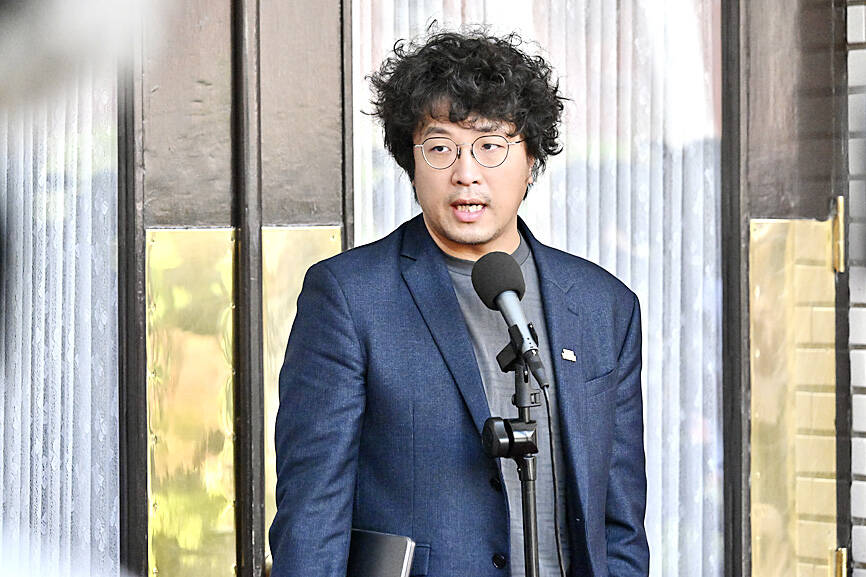A Chinese Nationalist Party (KMT) proposal to allow Chinese investment in Taiwan’s outlying islands would open the door for Chinese infiltration, Democratic Progressive Party (DPP) Legislator Puma Shen (沈伯洋) said on Tuesday.
KMT Legislator Chen Hsueh-sheng (陳雪生) proposed amendments to the Offshore Islands Development Act (離島建設條例) that would allow Chinese manufacturers to participate in industrial development and public construction projects on outlying islands.
The amendments would also open enrollment at colleges and universities on outlying islands to Chinese students, and exempt them from enrollment quota restrictions.

Photo: George Tsorng, Taipei Times
The proposals would “open four doors” to Chinese infiltration, Shen wrote on Facebook.
The first door would allow Chinese companies’ involvement in public infrastructure projects, and exclude them from normal restrictions, he said.
That would weaken Taiwan’s sovereignty and endanger national security by bypassing Article 17 of the Government Procurement Act (政府採購法), as well as provisions in Article 40 of the Act Governing Relations Between the People of the Taiwan Area and the Mainland Area (台灣地區與大陸地區人民關係條例), he said.
The second door would allow Chinese companies used for such procurements to send people to the islands, without being subject to normal rules on Chinese working in Taiwan, he said.
The amendments would also bypass rules stipulating that those coming to Taiwan from China for such projects not be allowed to change jobs within one year, he added.
The third door would permit workers and equipment from Chinese manufacturers to be brought into restricted areas, Shen said.
The fourth door is a clause in the proposals that would make the stipulations also applicable to Taiwanese companies, meaning that firms colluding with Beijing could bring in Chinese workers and equipment to the outlying islands, he said.
The national security implications of the proposals would be worse than those of the Cross-Strait Service Trade Agreement, the passage of which led to the 2014 Sunflower movement, DPP Legislator Huang Jie (黃捷) said.
If passed, the proposal would open up all areas of Taiwan’s outlying islands to Chinese spies, Huang said.
“It is being touted as a way to improve the efficiency of infrastructure projects, but in effect, it would open up a back door to China,” she said.
Under current regulations, manufacturers from foreign countries can only bid on public projects if there is a bilateral agreement signed by that country and Taiwan, she said.
Even then, if the project has national security implications, restrictions might be placed on the foreign company, she said.
As China and Taiwan have no such agreement, government tenders must be decided on a case-by-case basis, she added.
Speaking with reporters yesterday, Chen said that the outlying islands are unable to complete infrastructure problems due to a labor shortage.
“The ruling party is unable to solve that labor shortage. Instead of being so pessimistic, people should try to help solve the issue,” he said. “If you want to recall me, go ahead and do so.”
Asked whether the proposal would “open a back door” for China, Chen said that allowing Chinese tourists to visit Taiwan was “already opening the door to China.”

A Vietnamese migrant worker on Thursday won the NT$12 million (US$383,590) jackpot on a scratch-off lottery ticket she bought from a lottery shop in Changhua County’s Puyan Township (埔鹽), Taiwan Lottery Co said yesterday. The lottery winner, who is in her 30s and married, said she would continue to work in Taiwan and send her winnings to her family in Vietnam to improve their life. More Taiwanese and migrant workers have flocked to the lottery shop on Sec 2 of Jhangshuei Road (彰水路) to share in the luck. The shop owner, surnamed Chen (陳), said that his shop has been open for just

Global bodies should stop excluding Taiwan for political reasons, President William Lai (賴清德) told Pope Francis in a letter, adding that he agrees war has no winners. The Vatican is one of only 12 countries to retain formal diplomatic ties with Taiwan, and Taipei has watched with concern efforts by Beijing and the Holy See to improve ties. In October, the Vatican and China extended an accord on the appointment of Catholic bishops in China for four years, pointing to a new level of trust between the two parties. Lai, writing to the pope in response to the pontiff’s message on Jan. 1’s

TAKE BREAKS: A woman developed cystitis by refusing to get up to use the bathroom while playing mahjong for fear of disturbing her winning streak, a doctor said People should stand up and move around often while traveling or playing mahjong during the Lunar New Year holiday, as prolonged sitting can lead to cystitis or hemorrhoids, doctors said. Yuan’s General Hospital urologist Lee Tsung-hsi (李宗熹) said that he treated a 63-year-old woman surnamed Chao (趙) who had been sitting motionless and holding off going to the bathroom, increasing her risk of bladder infection. Chao would drink beverages and not urinate for several hours while playing mahjong with friends and family, especially when she was on a winning streak, afraid that using the bathroom would ruin her luck, he said. She had

MUST REMAIN FREE: A Chinese takeover of Taiwan would lead to a global conflict, and if the nation blows up, the world’s factories would fall in a week, a minister said Taiwan is like Prague in 1938 facing Adolf Hitler; only if Taiwan remains free and democratic would the world be safe, Deputy Minister of Foreign Affairs Francois Wu (吳志中) said in an interview with Italian newspaper Corriere della Sera. The ministry on Saturday said Corriere della Sera is one of Italy’s oldest and most read newspapers, frequently covers European economic and political issues, and that Wu agreed to an interview with the paper’s senior political analyst Massimo Franco in Taipei on Jan. 3. The interview was published on Jan. 26 with the title “Taiwan like Prague in 1938 with Hitler,” the ministry